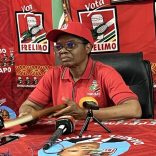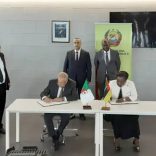Mozambique: 'Naparamas' surrender and ask for government support in Mutuali - O País | Photos
Dhlakama-Nyusi deal to appoint mayors faces Constitutional hurdles – By Joseph Hanlon

Questions are being raised about the decentralization deal announced 7 February by President Filipe Nyusi, because it would end direct election of mayors. Nyusi and Renamo head Afonso Dhlakama agreed that provinces, districts and municipalities would all have the same structure, with a directly elected assembly. The party or coalition which received a majority of votes in the provincial election would then select the senior figure – governor, district administrator, and mayor – who would be formally named by central government. This person must be an elected member of the assembly.
The choice would be made by the political parties, not by the assembly itself, which means that governors, district administrators and mayors would be selected nationally, not locally.
These senior figures would have authority over devolved matters, as the municipal mayor does now. Central government would also name a second senior figure – a secretary of state at provincial level – who would be responsible for matters which remain the responsibility of central government. Thus at provincial level there would be two people of equal status – a governor for devolved matters and a secretary of state for matters under the control of central government.
Thus provinces and districts would follow the model already in operation in the 53 municipalities, with the important difference that currently the mayor is directly elected, and would in future be appointed. This change would be made this year, so only municipal assemblies and not the mayor would be elected in November.
Nyusi in his statement said that this requires a constitutional amendment which can be approved by parliament. Lawyers, however, contest this. They point out that the constitution says that “the executive body of the municipality shall be headed by a President [mayor] elected by universal, direct, equal, secret, personal and periodic suffrage by registered voters residing in the respective territorial constituency.” (art 275) It also says that any amendments which affect “universal, direct, secret, personal, equal and periodic suffrage in the designation of the elective holders of the organs of sovereignty, of the provinces and of local government” must be subject to a referendum. (art 292)
Thus it would seem that taking away the popular vote for the mayor cannot be changed by parliament, but must go to a referendum. Mozambique has never had such a national referendum, which would require new legislation. In practice the referendum would have to take place at the same time as the October 2018 national election – after the scheduled election of mayors in October this year.
A further problem is that the constitution (art 136) states that a referendum is valid only if more than half of voters actually vote. But the turnouts in the 2014, 2019, and 2014 national elections were all below 50%.
In a statement published in O Pais (on line) Friday, Dhlakama said that a referendum was not required because his agreement with Nyusi overrides the constitution. He said: “I do not see the force majeure for a referendum. It was a negotiation between the government and the opposition, in this case Renamo. The lawyers are right as jurists, but they have no reason to talk about a referendum, it has nothing to do with this.”
Party cooperation will be needed
The parties choosing the governor or mayor will be those which received a majority of votes – not those with the majority of seats in the assembly. In Manica in 2014, no party had a majority in the assembly. The National Elections Commission has still not released the full results for the 2014 election, but it appears that because of the way seats are assigned, Frelimo won a majority of seats in the Nampula assembly (47 of 93) without obtaining a majority of the votes. Thus Frelimo would have needed the support of another party to name a governor. This seems a recipe for deadlock.
New life for provincial assemblies and small parties
Until now, provincial assemblies (Assembleias Provinciais, APs) have not been taken seriously either by the parties or the national government. APs already have the power to approve or reject the provincial plan and budget, and to monitor the carrying out of that plan and budget. But lack of money means that APs do little.
But the decentralisation agreed between Nyusi and Dhlakama could give them much more importance. And small parties which elect just a few members to an AP could end up with a strategic role in those provinces where neither of the two big parties, Frelimo and Renamo, wins an absolute majority of votes. Parties will have to come together to name a governor and pass local legislation.
Renamo boycotted the opening of provincial assembly sessions in 2015 because it contested the outcome of the elections. A quorum of more than half the members is needed to operate, so in most provinces the AP has a Frelimo majority and could start.
Two AP examples show how collaboration works in different ways. In Manica, Frelimo has 40 of 80 AP members, Renamo has 39, and there is 1 MDM member, Domingos Alberino Soqueres, who has significant power. With precisely half the votes, Frelimo did not have a quorum on its own, but Soqueres did participate in the opening and voted for Frelimo members, Rosita Lubrino as speaker and Custodio Titosse as deputy speaker. Later Renamo took its seats.
In Maputo province there was a different experience. Frelimo had a large majority – 59 of 80 seats – but MDM won 9 seats (8 in Matola and 1 in Boane). An agreement as reached between the two, and an MDM member was named deputy speaker.
But provincial assemblies have done little. Most AP members live in the districts and for assembly sessions must go to the provincial capital, but provincial assemblies have no funds for travel and accommodation during the session. Members of the Plan and Budget committee of the national parliament have now visited all of the provincial assemblies and found that only one has proper facilities. The assemblies meet in borrowed installations, and in one province even in a garage. Only Zambezia built a building for its AP.
By Joseph Hanlon













Leave a Reply
Be the First to Comment!
You must be logged in to post a comment.
You must be logged in to post a comment.